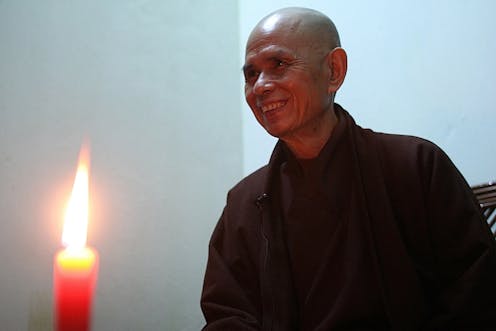Thich Nhat Hanh, the Buddhist monk who introduced mindfulness to the West, prepares to die
Devotees from many parts of the world are visiting the ailing 92-year-old monk, who has retired to a Buddhist temple. He taught how the practice of mindfulness could be combined with daily actions.

Thich Nhat Hanh, the monk who popularized mindfulness in the West, has returned home to Vietnam to enjoy the rest of his life. Devotees from many parts of the world are visiting the ailing 92-year-old, who has retired to a Buddhist temple outside Hue.
This thoughtful and accepting approach to his own failing health seems fitting for the popular Buddhist teacher, whose followers include a thousand Buddhist communities around the world and millions more who have read his books. For everyone, his teachings encourage being present in the moment.
As a scholar of the contemporary practices of Buddhist meditation, I have studied his simple yet profound teachings, which combine mindfulness along with social change.
Peace activist
In the 1960s, Thich Nhat Hanh played an active role promoting peace during the years of war in Vietnam. Hanh was in his mid-20s when he became active in efforts to revitalize Vietnamese Buddhism for peace efforts.
Over the next few years, Thich Nhat Hanh set up a number of organizations based on Buddhist principles of nonviolence and compassion. His School of Youth and Social Service, a grassroots relief organization, consisted of 10,000 volunteers and social workers offering aid to war-torn villages, rebuilding schools and establishing medical centers.
He also established the Order of Interbeing, a community of monastics and lay Buddhists who made a commitment to compassionate action and supported war victims. In addition, he founded a Buddhist university, a publishing house, and a peace activist magazine as a way to spread the message of compassion.
In 1966, Thich Nhat Hanh traveled to the United States and Europe to appeal for peace in Vietnam.
In lectures delivered across many cities, he compellingly described the war’s devastation, spoke of the Vietnamese people’s wish for peace and appealed to the U.S. to cease its air offensive against Vietnam.
During his years in the U.S., he met Martin Luther King Jr., who nominated him for the Nobel Peace Prize in 1967.
However, because of his peace work and refusal to choose sides in his country’s civil war, both the communist and noncommunist governments banned him, forcing Thich Nhat Hanh to live in exile for over 40 years.
During these years, the emphasis of his message shifted from the immediacy of the Vietnam War to being present in the moment – an idea that has come to be called “mindfulness.”
Being aware of the moment
Thich Nhat Hanh first started teaching mindfulness in the mid-1970s. The main vehicle for his early teachings was his books. In “The Miracle of Mindfulness,” for example, Thich Nhat Hanh gave simple instructions on how to apply mindfulness to daily life. This book was translated into English for a global audience.
In his book, “You Are Here,” he urged people to pay attention to what they were experiencing in their body and mind at any given moment, and not dwell in the past or think of the future. His emphasis was on the awareness of the breath. As you follow the breath, he taught his readers to say internally, “I’m breathing in; this is an in-breath. I’m breathing out: this is an out-breath.”

People interested in practicing meditation didn’t need to spend days at a meditation retreat or find a teacher. His teachings emphasized that mindfulness could be practiced anytime, even when doing routine chores.
Even when doing the dishes, people could simply focus on the activity and be fully present. Peace, happiness, joy and true love, he said, could be found only in the moment.
Mindfulness in America
Hanh’s mindfulness practices don’t advocate disengagement with the world. Rather, in his view, the practice of mindfulness could lead one toward “compassionate action,” like practicing openness to other’s viewpoints and sharing material resources with those in need.
Jeff Wilson, a scholar of American Buddhism, argues in his book, “Mindful America,” that it was Hanh’s combination of daily mindfulness practices with action in the world that contributed to the earliest strands of the mindfulness movement. This movement eventually became what Time Magazine in 2014 called the “mindful revolution.” The article argues that the power of mindfulness lies in its universality, as the practice has entered into corporate headquarters, political offices, parenting guides and diet plans.
For Thich Nhat Hanh, however, mindfulness is not a means to a more productive day but a way of understanding “interbeing,” the connection and codependence of everyone and everything. In a documentary “Walk With Me,” he illustrates interbeing in the following way:
A young girl asks him how to deal with the grief of her recently deceased dog. He instructs her to look into the sky and watch a cloud disappear. The cloud has not died but has become the rain and the tea in the teacup. Just as the cloud is alive in a new form, so is the dog. Being aware and mindful of the tea offers a reflection on the nature of reality.
He believes this understanding could lead to more peace in the world.
In 2014, Thich Nhat Hanh suffered a stroke. Since then, he has been unable to speak or continue his teaching. In October of 2018 he expressed his wish, using gestures, to return to the temple in Vietnam where he was ordained as a young monk.
Brooke Schedneck does not work for, consult, own shares in or receive funding from any company or organization that would benefit from this article, and has disclosed no relevant affiliations beyond their academic appointment.
Read These Next
Bad Bunny says reggaeton is Puerto Rican, but it was born in Panama
Emerging from a swirl of sonic influences, reggaeton began as Panamanian protest music long before Puerto…
The cost of casting animals as heroes and villains in conservation science
New research shows how these storytelling choices can distort science – and how to move beyond them.
How protecting wilderness could mean purposefully tending it, not just leaving it alone
For decades, wilderness lands have been left largely unaltered by human activity. But those places are…





